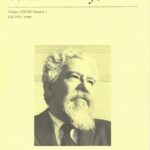Dr. Peter Saulson
But for that which is more real than the material world, Heschel showed me the path on which to walk.

Physicist, MIT and Syracuse
Rhode Island
A Jewish Perspective
Where did you first encounter Heschel’s work?
At age 50, I’d spent my adult life estranged from Judaism, but an impulse purchase of a new translation of the Torah drew me into a renewed quest for connection. The way into our foundational text was rocky, however. Who is the God who speaks to us from its pages? What is it that God most wants from us? I scoured the Judaica sections of bookstores seeking guidance. I found especially helpful the then–newly published book by Arthur Green Ehyeh: A Kabbalah for Tomorrow. In it, he offers the following advice for beginning learners: "My own teacher, Abraham Joshua Heschel, was a most gifted writer as well as a profound thinker. Go first to his God in Search of Man. Its opening section is the best introduction anywhere to understanding what it means to be a religious person and to be on a seeker's path." That was the clue that I needed. Green was absolutely right. I’ve been reading Heschel carefully ever since.
How did Heschel and his thinking inspire your work, religious life, or civic engagement?
Abraham Joshua Heschel isn’t often recognized as a deep thinker about science, but he has profoundly shaped my outlook as a physicist.
When I read Heschel’s God in Search of Man, it feels as if it had been written especially for me, with the questions that a scientist and a modern would raise about our tradition. That doesn’t mean that it was straightforward to understand his answers to those questions. It has been an ongoing struggle, but I’ve always been confident that Heschel was addressing the issues that I cared most about.
Readers won’t miss his emphasis on the ineffable character of existence and on our responses of wonder and awe to the ineffable. But what is truly ineffable about our world? What is most deserving of our awe? One haiku-like sentence from Man Is Not Alone best sums up what I’ve learned from Heschel. “The world consists, not of things, but of tasks.” On first reading, the physicist in me rebels. How can the world be made of anything but things? But Heschel is being sly. Of course, there’s a valid point of view from which we can say that the world is made precisely of things. Heschel is profoundly respectful of what we can learn from the natural sciences. More important, however, is the aspect of the world in which human beings are agents, directing our energy toward fulfilling the tasks with which we are charged by the prophets—creating a world in which love of neighbor, stranger, and God govern all of our actions.
Heschel teaches us how to read the Torah for insight and guidance. “In the prophets the ineffable became a voice, disclosing that God is not a being that is apart and away from ourselves . . . but justice, mercy; not only a power to which we are accountable, but a pattern for our lives.” I no longer believe that science is the sole path toward knowledge of the world. For its material parts—yes, natural science offers the best way forward. But for that which is more real than the material world, Heschel showed me the path on which to walk.
What of Heschel lives in you?
Since retiring from my career of physics research and teaching, I’ve focused my activity on Heschel’s understanding of how Jewish thought complements the scientific project in giving a fuller account of our world. Alongside my private learning, I’m relearning Heschel’s writings with several havruta (small groups). As opportunities arise, I’m also sharing what I’ve learned with larger groups. In these small ways, I feel that I'm continuing one of Heschel's main projects: to share with modern Jews the depth and richness of Jewish thought, a sorely needed complement to the scientific worldview.

